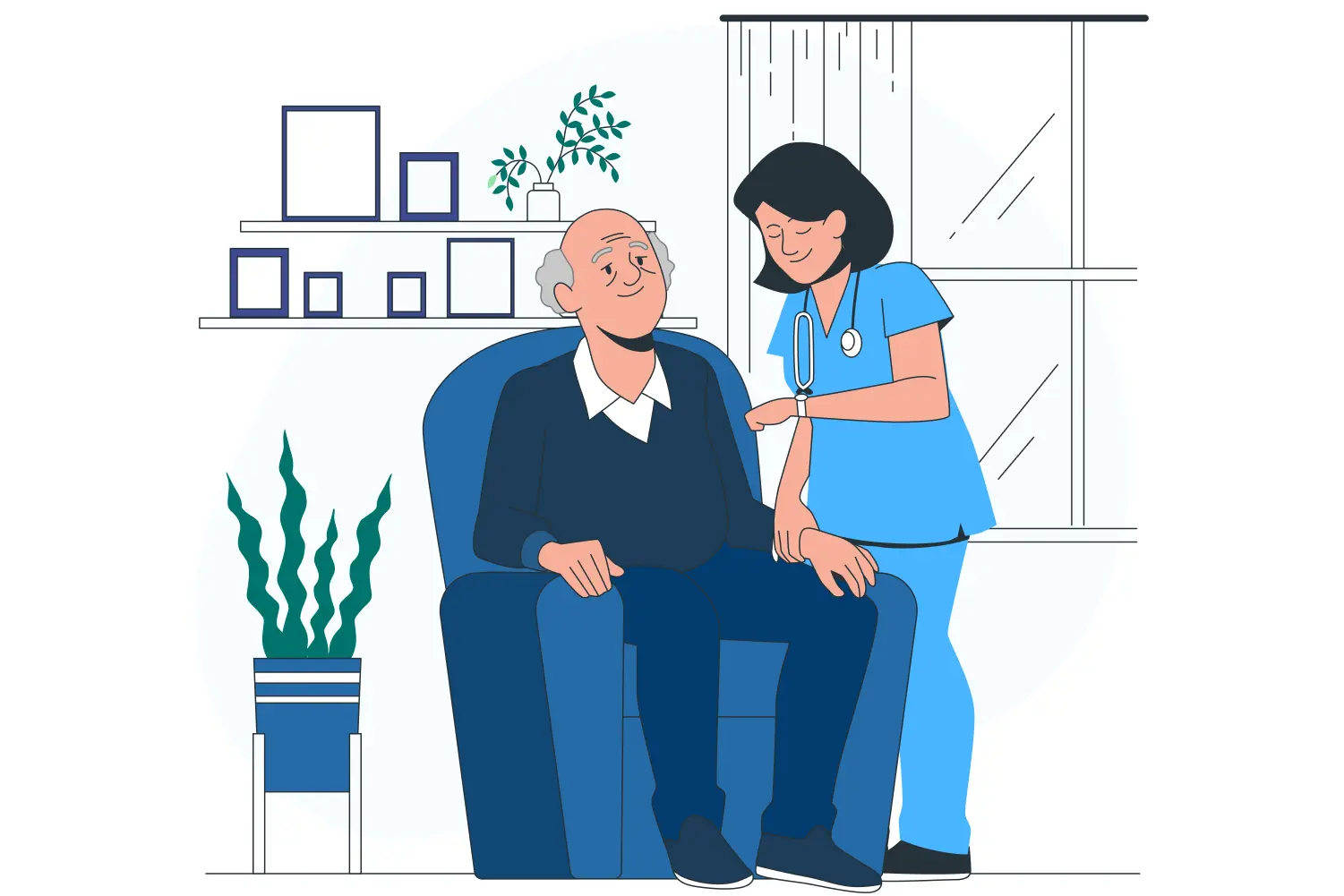No products in the basket.
Introduction
Do you want to know more about mental health problems? Or do you want to become a mental health specialist? Our blog will provide essential knowledge about the importance of mental wellbeing. Also, about How to Spot Warning Signs in the early stage.
Understanding Mental Health and Illnesses
The emotional, psychological, and social well-being of a person is referred to as “mental health.” It has an impact on how we think, feels, and act in our daily lives. Poor mental state may lead to a variety of mental health problems and illnesses. Whereas a good mental state helps us to live full and productive lives.
Mental state is an important part of our overall well-being, and it should be given the same level of attention and care as physical health.
Conditions that influence a person’s thinking, emotions, or behaviour are referred to as “mental health illnesses.” mental health problems might range from minor to severe and affect several elements of a person’s life. Anxiety disorders, mood disorders (such as depression), psychotic disorders (such as schizophrenia), and personality disorders are among the most prevalent mental health illnesses.
It is critical to remember mental health problems and issues. Like physical illnesses, are medical conditions that may be treated. Many people with mental illnesses may have healthy and productive lives with the right treatment and support.
It is also critical to understand that mental health is not static and can vary throughout time. Everyone’s mental health has ups and downs. but it’s important to get treatment if you’re struggling to manage. Also if your symptoms continue for a lengthy period of time.
Identifying and Managing Stress
Work, school, relationships, and personal issues may all contribute to stress. Which is a natural part of life. Stress, when managed effectively, may inspire and invigorate us. When stress becomes persistent and overwhelming, it may have a severe impact on both our mental and physical health.
Stress symptoms can include physical symptoms. Such as headaches, muscular tightness, and weariness. As well as mental symptoms such as anxiety, anger, and sadness.
There are various stress management methods, including:
- Exercise: Physical activity on a regular basis can help reduce stress and enhance general well-being. Mindfulness and meditation practice can help you focus on the present moment and minimise emotions of tension and worry.
- Healthy coping mechanisms: Identifying good coping techniques. Such as hobbies or spending time with loved ones. Which can aid with stress management.
- Time management: Setting realistic objectives and prioritising your work can help decrease stress and boost emotional control.
- Good sleep hygiene: Adequate sleep and proper sleep hygiene can help decrease stress. Also to enhance overall mental and physical health.
- Professional help: If you’re having trouble dealing with stress. receiving help from a mental health expert can be quite beneficial.
Remember to take care of yourself and seek help when necessary. You may enhance your entire mental and physical well-being by learning how to detect and handle stress.
The Importance of Self-Care and Self-compassion
“Self-care” refers to the acts and behaviours that people take part in to keep their physical, emotional, and mental health in check. “Self-compassion” on the other hand, is a style of interacting with oneself that is kind, understanding, and compassionate, particularly through tough circumstances.
Self-care and self-compassion are beneficial to our general well-being because they allow us to:
- Manage stress: We may minimise stress and enhance our general mental health by engaging in self-care routines and being self-compassionate.
- Improve our mood: Self-care activities and self-compassion may lift our spirits and promote emotions of happiness and well-being.
- Increase self-awareness: We may become more conscious of our thoughts, feelings, and actions. By taking the time to care for ourselves and be self-compassionate. Which can help us make positive changes in our lives.
- Build resilience: Practising self-care and self-compassion on a regular basis can help us develop resilience and cope with life’s obstacles more effectively.
Exercising, getting adequate sleep, eating a nutritious diet. Also participating in hobbies, and spending time with loved ones are all examples of self-care activities. Try talking to yourself with love and understanding.
Concentrating on your strengths and successes. Also treating yourself with the same care and compassion you would show to a friend to develop self-compassion. We may enhance our mental and emotional well-being and live more fulfilled and gratifying lives. By incorporating self-care and self-compassion into our everyday lives.
Building and Maintaining Positive Relationships
Positive interpersonal interactions may have a tremendous influence on our mental and emotional well-being. Building and sustaining strong connections takes time and work, but the rewards are well worth it. Here are some suggestions for developing and sustaining great relationships:
- Communication: It is a must for developing solid connections. Make an effort to actively listen, communicate oneself clearly, and respect the ideas of others.
- Try to comprehend other people’s points of view and sentiments: This can aid in the development of trust and the strengthening of relationships.
- Kindness and compassion: Even in terrible conditions, show kindness and compassion to others. This might aid in the development of trust and respect in your relationships.
- Boundaries: Maintaining effective relationships requires the establishment of appropriate boundaries. Let people know what you consider acceptable and unacceptable, and respect others’ boundaries.
- Spending quality time with loved ones: It may help build relationships and enhance overall well-being.
- Forgiveness: Letting go of grudges and forgiving people can help you decrease stress and strengthen your relationships.
Remember that it takes time and effort to create and maintain strong connections. You may enhance your mental and emotional well-being and lead a better, more satisfying life. By prioritising these connections and making an effort to interact and connect with people.
Coping with Anxiety and Depression

Anxiety and depression are frequent mental health issues that can have a substantial influence on a person’s everyday life. However, with adequate therapy and self-care, many disorders may be managed and mental well-being improved. Here are some coping strategies for anxiety and depression:
- Seek expert help. Speak with a mental health expert who can give a diagnosis and establish an appropriate treatment plan for you.
- Regular physical activity can help lessen anxiety and depression symptoms and enhance general well-being.
- Mindfulness and meditation practice can help you focus on the present moment and minimise emotions of worry and despair.
- Healthy coping mechanisms: Identifying healthy coping strategies, such as hobbies or spending time with loved ones, can aid in the positive management of anxiety and depression.
- Getting adequate sleep and practising excellent sleep hygiene can help minimise anxiety and depression symptoms and enhance overall mental and physical health.
- Connect with others: Connecting with friends, relatives, or a support group can give you a sense of community and make you feel less isolated.
Remember to be nice and sympathetic to yourself and to seek help when you need it. It is possible to manage anxiety and depression and enhance your general well-being by learning coping methods and obtaining professional support.
Stigma and Mental Health
Individuals suffering from mental disorders may be negatively impacted by the stigma surrounding mental health. “Stigma” refers to unfavourable attitudes, beliefs, and behaviours directed toward those who have mental problems. Here are some of the ways stigma may have an influence on mental health:
- Stigma discourages people from getting help because it makes them feel embarrassed or humiliated about their mental health problems.
- Stigma may cause feelings of isolation and prejudice, which can impede healing and make it more difficult for people to manage their mental health disorders.
- Stigma may lead to social isolation and significantly damage personal connections, making it difficult for individuals to create and maintain supportive networks.
- Improves Mental Health Stigma may exacerbate the burden of mental health disorders by adding stress and worry to the lives of those who are already struggling.
It is critical to improve mental health awareness and to overcome the stigma that surrounds mental health disorders. We can promote mental wellbeing and lessen the burden of mental health disorders on individuals and communities by removing obstacles to getting treatment and encouraging understanding.
Clinical physiology
Clinical physiology is a medical specialty. Which is concerned with the evaluation and management of physiological systems. For individuals suffering from sickness or disease. It entails the use of modern technologies and procedures. To investigate the processes of the body.
Which includes the circulatory, respiratory, digestive, and neural systems. Clinical physiologists employ a number of approaches to diagnose and treat illnesses. Such as heart disease, respiratory issues, and sleep disturbances.
They also serve an important role in diagnosing and monitoring physiological changes in severely sick patients. As well as assessing therapy success. They collaborate with other healthcare professionals to provide a complete approach to patient care, assisting in the improvement of patient outcomes and the reduction of the burden of sickness and disease on quality of life. Clinical physiologists are highly trained experts that specialise in assessing and monitoring physiological processes.
Summary
The term “mental health” refers to an individual’s emotional, psychological, and social well-being. Mental wellbeing is an individual’s emotional, psychological, and social well-being. Poor mental health can lead to a variety of mental health problems and illnesses.
Positive interpersonal relationships can have a huge impact on our mental and emotional health. Building and maintaining deep friendships requires time and effort, but the benefits are worth the effort. Forgiving others and letting go of grudges can help reduce stress and build relationships.
With the rising mental health crisis, it is more important than ever for us to educate ourselves about how to recognize potential warning signs of depression, anxiety, and other forms of psychological distress.
FAQs
How to cope up with any mental trauma?
Seek professional help, practise self-care. Also engage in activities that promote physical and emotional well-being. Also be connected with support, identify and practise healthy coping mechanisms. One can also try to use journaling, art therapy, or deep breathing exercises to manage symptoms and promote healing. Also Joining a support group to connect with others who have experienced similar traumas can be beneficial.
What are the Physical Activities for Mental Well-being?
Physical activity can have a positive impact on mental health, such as exercise, yoga, nature activities, team sports, and dance. Regular exercise can reduce symptoms of depression and anxiety and improve mood. Yoga can help reduce stress and improve mental well-being. Nature activities can have a calming and restorative effect on mental health.
Team sports can help improve mood and provide a sense of community and social support. Dancing can be a fun and expressive way to improve physical and mental health. It is important to find an activity that you enjoy and that fits into your lifestyle.
How important is it to Seek Professional Help for mental health?
Seeking professional care for mental health issues is critical. Psychologists, psychiatrists, and therapists, for example, are educated to diagnose and treat mental health illnesses. Also they may provide a safe and helpful setting for people to work through their issues.
Here are some of the reasons why obtaining professional help is essential:
- Early Intervention: Seeking guidance early can stop mental health conditions. Such as from getting worse and increasing the likelihood of a positive outcome.
- Accurate Diagnosis: Mental health specialists can make an accurate diagnosis. Also can create a customised treatment plan for you.
Effective Treatment: To help manage symptoms and enhance mental wellbeing. mental health professionals can offer evidence-based treatments like therapy and medication.
What is the Impact of Sleep on Mental Health?
Sleep is critical for emotional and mood regulation. Also for stress management, cognitive function, and decision-making. Hence it has a significant influence on mental health. Sleep deprivation can cause irritability, anxiety, and depression. As well as to decrease cognitive function and raise the risk of mental health issues. This can be detrimental to one’s mental health and quality of life.
What are the four different categories of mental wellbeing?
Mental health is a person’s emotional, psychological, and social well-being. Which can be improved through therapy and positive interpersonal interactions. There are four different categories of mental health:
- Disorders of the mood (such as depression or bipolar disorder
- Anxiety disorders are a type of phobia.
- Personality flaws.
- Psychotic illnesses (such as schizophrenia)





